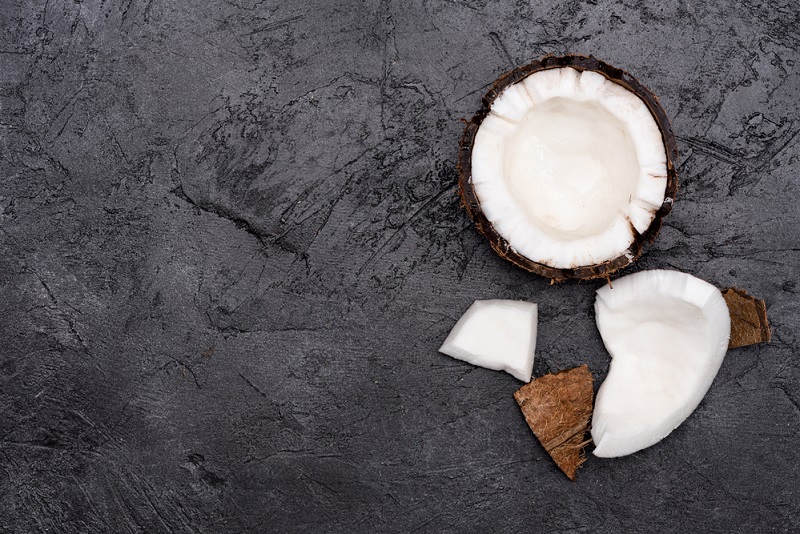
Sugar is a tough topic for fitness and nutrition enthusiasts. It makes things taste great, but the adverse health effects of sugar are well documented.
For those who can’t stomach cutting sugar completely, but who want to commit to better nutrition habits, coconut sugar is a viable alternative.
Some whey protein powders are beginning to use coconut sugar in place of classic white sugar, as it offers some health benefits and fewer adverse effects.
If you’re worried about the damage regular sugar does to your body, you can use coconut sugar as a replacement in just about any situation.
Read on and we’ll explain how coconut sugar makes a better alternative.
What is Coconut Sugar?
Coconut sugar is a natural sweetener, derived from the coconut palm tree. It comes from the sap of the tree, and is sometimes called coconut palm sugar.
To produce coconut sugar, farmers extract sap, or nectar, from the stem of a coconut palm tree. The sap is then boiled and dried, until only brown granules are left.
In its final form, coconut sugar looks and tastes quite similar to brown sugar. It’s worth noting that it doesn’t actually have a strong coconut flavor, in case that may be something that turns you off.
Note that coconut palm sugar (which we’ll simply refer to as coconut sugar) and palm sugar are not the same, though these two are often confused.
Why Coconut Sugar is a Better Alternative to Regular White Sugar
Coconut sugar offers several health benefits over regular sugar, which makes it a great choice if you’re trying to be more health-conscious, without sacrificing taste.
These benefits are not huge – it’s not a good idea to go out and put coconut sugar on everything you eat – however, they offer a compelling case for it as an alternative sweetener in your diet.
Here are some ways coconut sugar comes out ahead.
Higher nutrient levels

Regular sugar offers next to zero nutritional value. The calories in sugar are “empty” calories, meaning it offers no nutrients that are beneficial to the human body.
While the calories in coconut sugar and regular sugar are the same, coconut sugar has small amounts of some beneficial compounds. These include iron, zinc, calcium, and potassium – minerals that are found in other coconut-derived foods as well.
Coconut sugar also has polyphenols, flavonoids, and anthocyanidins. These are a class of nutrients called phytonutrients, which offer some health benefits such as reducing blood sugar, cholesterol, and inflammation.
Lower glycemic index
Coconut sugar has a lower glycemic index (GI) than regular table sugar. While normal sugar has a GI of 60, coconut sugar’s GI is 54, meaning it does not spike blood sugar as much.
GI values can vary between people and testing methods though, and some tests have even shown coconut sugar to have a GI value as low as 35.
Taking in a lot of coconut sugar will still result in high blood glucose levels, but it won’t cause a spike as easily as white sugar.
Contains inulin for gut health and blood sugar control

Coconut sugar contains a fiber called inulin, which may aid gut health. Inulin acts similarly to prebiotics, by helping cultivate the production of beneficial bacteria in the gut.
Better gut health leads to numerous health benefits, from regulating bowel movements and digestion, helping your body absorb nutrients from food to providing support for the immune system.
Inulin is also said to help improve blood sugar control, by slowing digestion and release of sugar-loaded carbohydrates. This may contribute to the lower glycemic index of coconut sugar, and explain why it doesn’t spike blood glucose levels as much as regular sugar.
Final Thoughts: How Healthy is Coconut Sugar?
Coconut sugar is clearly a healthier alternative to regular sugar. It provides slight levels of beneficial nutrients such as zinc, calcium, and potassium, which normal table sugar does not.
Coconut sugar also does not raise blood glucose as high and as fast, due to its lower glycemic index, and the beneficial qualities of the fiber inulin. This means it’s a better choice for controlling and regulating blood sugar levels.
The higher fiber content is also a plus, as fiber is vital for a healthy digestive system, preventing problems with bowel movements and aiding the immune system.
That being said, coconut sugar should not be considered completely healthy, as it can still present some of the same health risks as regular sugar, in high doses. The nutrients present in coconut sugar are not enough to offer significant health benefits on their own, and high levels of coconut sugar will likely have a negative effect on blood glucose levels, weight, and cardiovascular health.
However, you will be in a healthier place if you replace any regular sugar in your diet with coconut sugar, while maintaining an “in moderation” approach to sugar consumption.
Thanks for reading! This article is a guest post by our friends at Naked Nutrition, makers of organic, grass fed whey protein, greens powders, goat’s milk protein and other supplements sweetened with coconut sugar. To learn more or to check out their products, visit their website here.
Thanks for installing the Bottom of every post plugin by Corey Salzano. Contact me if you need custom WordPress plugins or website design.




